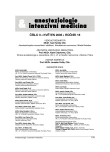-
Medical journals
- Career
Authors: Van Saene H. K. F. 1; L. Silvestri 2; De La Cal M. A. 3
Authors‘ workplace: Department of Medical Microbiology, University of Liverpool, UK 1; Department of Anaesthesia and Critical Care, Gorizia Hospital, Italy 2; Department of Critical Care Medicine, Getafe Hospital, Madrid, Spain 3
Published in: Anest. intenziv. Med., 16, 2005, č. 3, s. 152-160
Category: Intenzive Care Medicine - Comprehensive Report
Overview
Selective decontamination of the digestive tract [SDD] has been assessed in 54 randomised controlled trials (RCTs) and nine meta-analyses of RCTs only.The most recent meta-analysis includes 36 RCTS in 6,922 unselected patients, and shows that SDD, including enteral and parenteral antimicrobials, reduces the odds ratio for pneumonia to 0.35 [0.29 to 0.41], and mortality to 0.78 [0.68 to 0.89]. The absolute mortality reduction was 4.8%. This information implies that 5 ICU-patients need to be treated with SDD to prevent one case of pneumonia, and 21 ICU-patients need to be treated to prevent one death. Two recent large RCTs report an absolute mortality reduction of 8%, corresponding to the treatment of 12 patients with SDD to save one life. The 54 RCTs and the nine meta-analyses do not provide data for a link between SDD and antimicrobial resistance. The Cochrane Library meta-analysis reports that SDD does not lead to resistance amongst aerobic Gram-negative bacilli but, even better, the addition of enteral polymyxin/tobramycin to the parenteral antimicrobials reduces resistance compared with the parenteral antibiotics only. This is in line with a previous RCT demonstrating that enteral antimicrobials control extended spectrum beta-lactamase producing Klebsiella. Antimicrobial resistance, being a long-term issue, has been evaluated in eight studies monitoring antimicrobial resistance between two and seven years, and bacterial resistance associated with SDD has not been a clinical problem. Costs can hardly be a major concern for a manoeuvre of 6 Euros a day that reduces pneumonia by 65%, and mortality by 22% without antimicrobial resistance emerging in unselected patients. These data support level 1 evidence for SDD, allowing a grade A recommendation. The main reason for SDD not being widely used is the primacy of opinion over evidence.
Key words:
SDD (selective decomination of the digestive tract – infection in the ICU – evidence – CDC labels
Labels
Anaesthesiology, Resuscitation and Inten Intensive Care Medicine
Article was published inAnaesthesiology and Intensive Care Medicine

2005 Issue 3
Most read in this issue- Pre-emptive Analgesia with Ketamine and Morphine: a Clinical Study
- Acetaminophene Intoxication: a Case Report
- Influence of Major Abdominal Surgery on Intra-abdominal Pressure and Perfusion of Splachnic Organs
Login#ADS_BOTTOM_SCRIPTS#Forgotten passwordEnter the email address that you registered with. We will send you instructions on how to set a new password.
- Career

